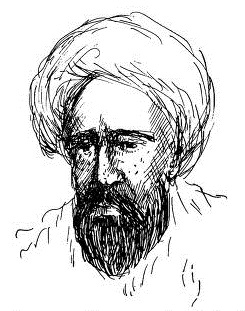| Buhturi Al-Walīd ibn Ubaidillah Al-Buḥturī أبو الوليد بن عبيدالله البحتري التنوخي | |
|---|---|
 A 1967 sketch is poet Buhturi by unknown artist from the book "Min Oyun al-Shi'r"by Naji al-Qashtini A 1967 sketch is poet Buhturi by unknown artist from the book "Min Oyun al-Shi'r"by Naji al-Qashtini | |
| Born | 821 Manbij, Bilad al-Sham, Abbasid Caliphate (now Syria) |
| Died | 897 (aged 75-76) Manbij, Abbasid Caliphate |
| Resting place | Manbij |
| Pen name | Al-Buhturi |
| Occupation | Arabic Poet |
| Language | Arabic |
| Nationality | Caliphate |
| Period | Islamic Golden Age (Abbasid era) |
Al-Walīd ibn Ubaidillah Al-Buḥturī (Arabic: أبو الوليد بن عبيدالله البحتري التنوخي, romanized: al-Walīd ibn `Ubayd Allāh al-Buhturī) (821–97 AD; 206–84 AH) was an Arab poet born at Manbij in Islamic Syria, between Aleppo and the Euphrates. Like Abū Tammām (ابو تمام), he was of the tribe of Tayy, from the Buhturids.
Biography
While still young, al-Buḥturī visited Abū Tammām at Homs, on whose recommendation the authorities at Ma'arrat an-Nu'man awarded al-Buḥturī an annual pension of 4000 dirhams. Later he went to Baghdād, where he wrote verses in praise of the caliph al-Mutawakkil and of the members of his court. Although long resident in Baghdād, he devoted much of his poetry to the praise of Aleppo, and his love-poetry dedicated to a girl, Aiwa, of that city. He died at Manbij in 897.
He was often compared with the famous poet Abu Tammâm, who was his contemporary and mentor. The poems of al-Buhturî are examples of the classical style in Arabic poetry. He worked as a panegyrist to make a living and gained fame with his panegyrics.
His dīwan (collected poetry) was edited and published twice in the 10th century. First by Abū Bakr al-Ṣūlī, in the section of whose book Kitāb Al-Awrāq (كتاب الاوراق) on Muḥadathūn (modern poets), al-Buḥturī is included among a group of fourteen poets whose dīwans al-Ṣūlī edited and arranged alphabetically according to the final consonant in each line. The second editor arranged his dīwan according to subject (1883, Istanbul). Like Abu Tammam, he made a collection of early poems also known as the Hamasah. These collections of poems are also known as Diwans.
References
- "The Diwan" (in Arabic).
- ^
 One or more of the preceding sentences incorporates text from a publication now in the public domain: Chisholm, Hugh, ed. (1911). "Buhturī". Encyclopædia Britannica. Vol. 4 (11th ed.). Cambridge University Press. p. 762. This references the Biography in McG. de Slane's translation of Ibn Khallikan's Biographical Dictionary (Paris and London, 1842), vol. iii. pp. 657 ff.; and in the Book of Songs of Abu al-Faraj al-Isfahani, vol. xviii. pp. 167-175.
One or more of the preceding sentences incorporates text from a publication now in the public domain: Chisholm, Hugh, ed. (1911). "Buhturī". Encyclopædia Britannica. Vol. 4 (11th ed.). Cambridge University Press. p. 762. This references the Biography in McG. de Slane's translation of Ibn Khallikan's Biographical Dictionary (Paris and London, 1842), vol. iii. pp. 657 ff.; and in the Book of Songs of Abu al-Faraj al-Isfahani, vol. xviii. pp. 167-175.
- "Abu Tammam and Al-Buhturi: Revisiting Their Relationship and Role in Modern Arabic Poetry". GeorgeNicolasEl-Hage.com.
- Ṣūlī (al-), Abū Bakr Muḥammad b. Yaḥyā (1934). Heyworth-Dunne, J (ed.). Kitāb al-Awrāķ (Section on Contemporary Poets) (in Arabic). London: Luzac.
This article about a poet is a stub. You can help Misplaced Pages by expanding it. |